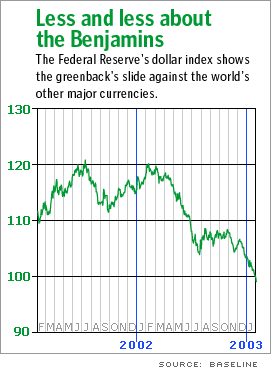NEW YORK (CNN/Money) - Not too long ago, whenever trouble brewed, global investors would scurry into the protective arms of the U.S. dollar.
If cold, hard cash was the safest asset around, the coldest and hardest belonged without doubt to the world's economic and military powerhouse. Even in the wake of Sept. 11, when it was America itself that had been attacked, the dollar gained ground.
But now the dollar's safety appears to be in doubt. When investors get the geopolitical jitters these days -- which is to say when Iraq is again grabbing the headlines -- the dollar gets dumped. Weak throughout the past year, the dollar's decline has lately accelerated, with the Federal Reserve's index of how the buck trades against a basket of currencies falling 6.7 percent since the beginning of December.
The question is: Why the slide? What's different this time around? And the answer, it seems, is that overseas investors, like their governments, are not taking a kind view of the U.S. government's course of action in Iraq. And they are putting their money where their mouths are.

"The global perception is the U.S. has the most to lose if there's a war in Iraq," said Brown Brothers Harriman currency economist Lara Rhame. "That's made the rest of the world averse to U.S. assets. Foreign investors are looking home again."
This occurs at a vulnerable time for the greenback. For one thing, with the economic downturn, U.S. assets no longer look like the sure thing they once were.
Moreover, the current account deficit -- basically exports of goods and services less imports -- has swelled to over 5 percent of gross domestic product. In the face of that, just for the dollar to tread water the United States needs to attract huge foreign inflows every day. It is hard to do this when the country appears headed toward a conflict that is seen by many global investors as nonsensical.
"The whole of Europe are pretty much against this war," said David Smith, managing director at Cantor Fitzgerald's London office. "There's all this skepticism that it's being done for oil or for elections, rather than because of a real need. People over here would like to see some reason why it should really be done."
The stark differences in the U.S. and the European views came into sharp contrast over the weekend at the World Economic Forum in Davos, Switzerland, where U.S. Secretary of State Colin Powell made it clear that the United States was willing to go to war with Iraq without the support of the United Nations.
"Europeans were surprised by how inexorably the U.S. administration was grinding toward denouement with Iraq," said Lehman Brothers chief global economist John Llewellyn, one of the Davos attendees. "And Americans were shocked by the strength of the European opposition to the war." One California CEO even complained to Llewellyn that he felt the U.S. press had been remiss in not informing the public how deeply Europeans feel that the White House has gone astray.
In the Gordon Gecko world of investing, of course, niceties about what investors think about politics don't matter for much. But if overseas investors believe the policy-making arm of the United States is, in some sense, broken, that is going to color their perception of the country as a place to invest. What's more, the greenback's decline risks feeding upon itself, because it could prompt overseas investors to worry about taking currency hits in U.S. assets. And so they could sell, sending down the dollar, Treasurys and U.S. stocks.
But even if conflict with Iraq is somehow avoided, or if the White House is able to gain wide international support for a regime change, the dollar may not see a return to its halcyon days. Its status as the safe currency has been broken, and investors may come to wonder why it held onto its status for so long.
For one thing the euro, the European common currency that just a few years ago many observers felt would not last, has come into its own. The euro has rallied sharply against the dollar, buying $1.0848 Monday, the highest in more than three years and up from $1.0837 Friday. The dollar bought 118.57 yen, up from 117.86 but near its lowest in two years.
For another, as Julius Baer head of international equities Riad Younes points out, the perception of the U.S. as a place of safety may be a hangover from the Cold War, when problems with the Soviet Union would strike fear in neighboring Europe. Now there is no longer an "Evil Empire" but an "Axis of Evil" -- Iraq, Iran and North Korea. All three seem more of a threat to U.S. interests than European ones.
"From that angle," said Younes, "the dollar as a safe haven is finished."

|

